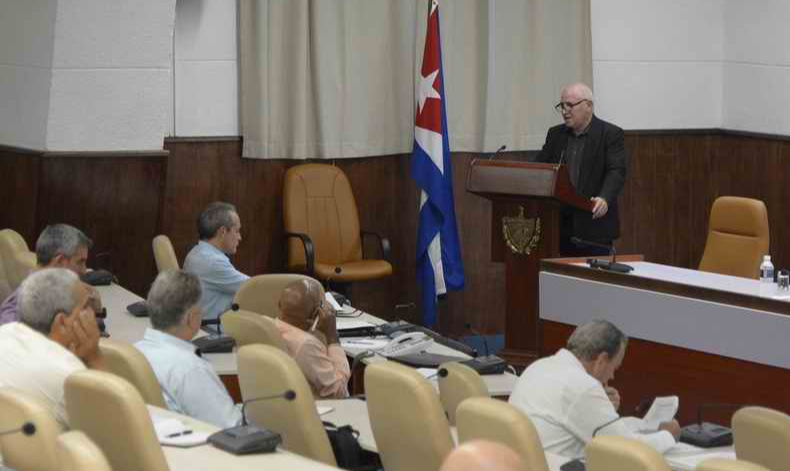
National Innovation Council in Cuba. Photos: Estudios Revolución
Havana, November 10 (RHC)-- The need to act against the depletion of natural resources and stop the impact of greenhouse gas emissions into the atmosphere by boosting innovative practices in the country was the main topic evaluated during the most recent meeting of the National Innovation Council, held at the Palace of the Revolution.
Headed by President Miguel Díaz-Canel Bermúdez and with the presence of Deputy Prime Minister Inés María Chapman, the exchange of academics, scientists, experts and managers this time went through the analysis of how much we could do to promote the concept of Circular Economy in the recycling industry, and in all our sectors, to achieve a better use of natural resources, in a nation like ours where the economy develops in very particular conditions.
The presentation of three papers on the current situation and perspective to advance in the concept of circular economy taking into account innovation, marked the exchange of the meeting.
As a practice of developed nations, the essence of the circular economy is to achieve a better use of raw materials and the reuse of solid waste, not only from an environmental point of view, but also from an economic and technological reconversion point of view.
Professor Dennis Oliva Merencio of the Technological University of Havana spoke about how to achieve greater sustainability in the country. Seeking greater strength in any innovation system and in particular when talking about circular economy in the recycling industry cannot ignore the need to achieve integration among all sectors of society, so the Doctor of Science, Lídice Vaillant, defended the need for the integration of all sectors and their interrelation.
In defining the concept of circular economy, the academic Dennis Oliva Merencio described it as encompassing and fundamental.
A wide-ranging exchange among experts, academics, producers and managers present, provoked the topic of circular economy and the need for its application as part of the permanent approach that must prevail in every project that is initiated.
President Miguel Díaz-Canel Bermúdez defined the circular economy as strategic, because of its transversal nature and what it implies in the creation of a culture for its implementation and its impact on transforming people's actions.
An important group of issues emerged from the meeting, which is why he insisted on the need to move forward in the creation of a Cuban strategy on circular economy.
"We must get everyone to think about Circular Economy, both in the business system and in the municipalities," said the president. He said that this will allow us to chain processes to reach new products and productive transformations.
During the new meeting of the National Innovation Council, which has become a pillar in the exercise of government in the country, it was informed that the digital site of the Presidency has a space that can be accessed, where 102 materials with a wide documentation on the meetings of this type held are currently inserted.
In the topic of analysis of the most recent meeting -the Circular Economy-, although our country is far from the practices implemented in developed nations, important areas were identified where it is possible to work integrally in order to multiply and make more sustainable the more efficient use of our natural resources, the reuse of solid waste generated by institutions and the population, and achieve greater productive linkages.

